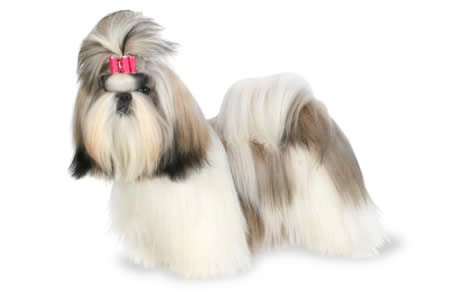Shih Tzu Breed Guide

Breed Group:
Companion Dogs
Get 30% off
Join our Newsletter
Sign Up Today
Shih Tzu Breed Information & Background
Based on DNA test, the Shih Tzu is known for being one of the most ancient breeds in the world. They are thought to have originated in Tibet and became popular in China where they were given the name Shih Tzu, meaning “little lion” or “little dog.”
In China, the Shih Tzu breed received a more stylized look as the Peking Kennel Club laid out the guidelines for proper breeding. The Chinese were mystified by the unique Shih Tzu personality and look. At the end of imperial rule in China, the dogs were fortunately brought to Europe, narrowly avoiding becoming extinct. All modern Shih Tzus descend from just fourteen dogs and were originally classified by English kennel clubs as Apsos. In 1935, the first European standard for the breed was developed, and the dogs were recategorized as the Shih Tzu. From there the breed spread throughout Europe and
In 1935, the first European standard for the breed was developed, and the dogs were recategorized as the Shih Tzu. From there the breed spread throughout Europe and was brought to America after U.S. military members brought them back from Europe. From there, their popularity increased around the world.
Shih Tzu Temperament & Behavior
Shih Tzus are known for being affectionate, well-behaved, and alert. Known for being lap dogs, they are typically sweet tempered and enjoy companionship. Some owners have noticed it takes them a little longer to pick up on basic commands but this is just due to a slight stubborn streak and can be worked through with a little patience, consistency, and time. Normally relatively quiet dogs, Shih Tzus aren’t known to be barkers but will let you know when they hear a strange noise or if someone is at the door.
How to train a Shih Tzu
While Shih Tzus can be known to have stubborn and independent characteristics, but this doesn’t mean that they are impossible to train. Consistency and repetition along with praise will help you set them up for success from day one. It’s important to understand what motivates your Shih Tzu, is it a yummy treat? Or a belly rub? A natural companion, giving your Shih Tzu your attention as a reward can often be motivating enough- you just need to determine their motivation and leverage it consistently through conditioning.
Another key aspect of training is to break things down into simple tasks and make sure they have completely mastered one before moving on to the other. Try not to write your pup off as stubborn and realize that consistency and simplicity when training Shih Tzus is pivotal to their success.
How Much Exercise Does a Shih Tzu Need?
Despite being lap dogs, Shih Tzus enjoy walking and depend on a steady schedule of exercise to maintain a healthy weight. Although they are not the type of dog that requires a big yard to run around in all day they benefit from walks and play time. Whether you take them on a brisk walk or let them run around the beach or a park, they love to play and are always up for an adventure. As with most dogs, exercise can also help prevent and manage small behavioral issues. One important thing to remember about Shih Tzus is that they can become overheated quickly, so be sure and keep an eye on this during summer months and make sure they take the time to cool down and stay hydrated.
Shih Tzu Life Span
Shih Tzu life expectancy typically ranges anywhere from 10 to 16 years.
How Popular is the Shih Tzu?
Fairly popular, especially amongst smaller dogs, The American Kennel Club ranked the Shih Tzu as the 15th most popular breed in 2015, falling from 11th in 2013.
Shih Tzu Food Recommendations
On average, Shih Tzus weigh 10 to 16 pounds. About 35 calories per pound they weigh is appropriate for adult dogs. As your Shih Tzu ages, you can ease up on the amount you feed them dropping it down to 30 calories per pound. Whether you weigh them at your home or the vet, it’s good to keep an eye on their weight as they age to help prevent any avoidable obesity-related health problems.
When your Shih Tzu is just a month old you can feel free to let them graze and eat throughout the day. However, once they are between three and twelve months old it’s good to get them on a daily feeding schedule.
How to Groom a Shih Tzu
If you are looking to show your Shih Tzu you will likely devote a good amount of time and resources to maintaining their longer coat. However, the average Shih Tzu owner will often opt for a simple short clip that is easier to maintain and often more comfortable for the dog. Either way, you’ll likely want to bathe them about every three weeks and carefully check their ears, clip their nails, and remove any matted hair as needed.
Are Shih Tzus Good With Kids?
A small dog with unaggressive behavior, Shih Tzus are great with children and can be a fun companion for your little ones. Affectionate and outgoing, they are the perfect size for your kids to play with and love the attention.
Shih Tzu Health Problems
- Brachycephalic Airway Syndrome: Common in smaller dogs, this terms is synonymous with smaller breeds that have breathing problems related to their physical structure. This occurs when the cartilage rings weaken and the muscles around the trachea begin to collapse. If untreated, the dog will likely cough as a result of the irritation and can results in serious distress in more severe cases.
- Hypoglycemia: Common in smaller dog breeds, low blood sugar is particularly an issue for Shih Tzu puppies. It will typically level out once they reach 9 weeks but can also be brought on by stress and therefore affect Shih Tzus of any age.
- Ear Infections: While common in many breeds, it’s important to keep an eye out for ear infections in Shih Tzus as their hanging ears leave them more vulnerable than those with erect ears. Symptoms of ear infections include scratching, hold their head to one side or rubbing their ears. Ear infections are often caused by improper drying of ears, wax buildup, hair growth inside the ear canal and a number of other issues. While not life-threatening, it’s best to treat ear infections early. Your vet will typically prescribe antibiotics and a medicated ear wash.
- Patellar Luxation: This occurs when the Shih Tzu’s kneecap slides out of its groove. Most common in smaller dogs, this is typically a congenital condition (that may appear later in life), although it can be caused by trauma. In most cases, especially if your dog is young, surgery is the recommended form of treatment. If more conservative approach would be to treat the dog with pain medication or anti-inflammatory drugs, however, while this may make them more comfortable, it will not solve the problem.
- Hip Dysplasia: A degenerative joint disease, hip dysplasia, is an abnormality in the hip joint that can cause the hip to slip out of place. Often times, the dogs are born with healthy hips but due to genetic factors the soft tissue grows abnormally and can cause the bones to move apart instead of staying together. Physical symptoms will be visible and can occur during the puppy stage as well as later in life. Treatment can be anything from weight management to surgery. Every dog is different so you’ll want to work with a vet to determine the proper treatment needed.
- Stenotic Nares: A serious Shih Tzu health problem affecting the inside of their nose, this occurs when the dog’s nostrils are extremely narrow which places increased stress on their respiratory system. Easy to spot, your Shih Tzu will show obvious signs of difficulty problems. While this can be a temporary issue as your Shih Tzu is teething if it does not resolve itself you will want to look into surgery to make sure that they have a long and healthy life.
- Tear Stains: Although it is typically only a cosmetic problem, tear stains are a common eye problem that’s caused by irritation or allergies from hair or debris.
Other Resources
National Breed Websites: American Shih Tzu, Inc.
Resources: Shih Tzu Rescue, Inc.
Health Issues Associated with this Breed:
- Allergies
- Anxiety
- Bladder Stones & Infections
- Ear Infections
- Eye Infections
- Hip Dysplasia
- Inflammation
- Intervertebral Disc Disease (IVDD)
- Juvenile renal dysplasia (JRD)
- Pain
- Patellar Luxation
- portosystemic liver shunt
- Reverse sneezing
- Separation Anxiety
- tooth and gum problems
- Umbilical hernia





